| Listing 1 - 10 of 17 | << page >> |
Sort by
|
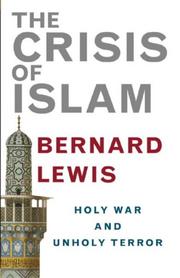
ISBN: 029764548X 9780297645481 Year: 2003 Publisher: London : Weidenfeld & Nicolson,
Abstract | Keywords | Export | Availability | Bookmark
 Loading...
Loading...Choose an application
- Reference Manager
- EndNote
- RefWorks (Direct export to RefWorks)
"The Crisis of Islam ranges widely through thirteen centuries of history, but in particular it charts the key events of the twentieth century leading up to the violent confrontations of today: the creation of the state of Israel, the Cold War, the Iranian Revolution, the Soviet defeat in Afghanistan, the Gulf War, and the September 11 attacks on the United States." "While hostility toward the West has a long and varied history in the lands of Islam, its current concentration on America is new. So too is the cult of the suicide bomber. Brilliantly disentangling the crosscurrents of Middle Eastern history from the rhetoric of its manipulators, Bernard Lewis helps us understand the reasons for the increasingly dogmatic rejection of modernity by many in the Muslim world in favor of a return to a sacred past. Based on his George Polk Award-winning article for The New Yorker, The Crisis of Islam is essential reading for anyone who wants to know what Usama bin Ladin represents and why his murderous message resonates so widely in the Islamic world."--Jacket.
Islam --- 845 Religie --- Islam and politics. --- Islamic fundamentalism. --- Jihad. --- Terrorism --- War --- Religious aspects --- Islam. --- Fundamentalismus. --- Heilige oorlog. --- Terrorisme. --- History.
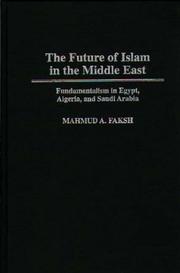
ISBN: 0275951286 Year: 1997 Publisher: Westport, Conn. ; London Praeger
Abstract | Keywords | Export | Availability | Bookmark
 Loading...
Loading...Choose an application
- Reference Manager
- EndNote
- RefWorks (Direct export to RefWorks)
Het is een gemeenplaats om te stellen dat het islamitisch fundamentalisme één van de grootste bedreigingen voor het Westen is. De vraag is uiteraard of zulke stelling op feiten is gebaseerd. Deze studie besteedt speciaal aandacht aan de beperkingen van het islamitisch fundamentalisme als alternatief voor de bestaande politieke en maatschappelijke orde in het Midden-Oosten, zowel op theoretisch-ideologisch vlak als in de praktijk. De auteur verdedigt de stelling dat het fundamentalisme in feite over zijn hoogtepunt heen is, mede omdat de staten een anti-fundamentalistische strategie ontwikkelen. Case studies over Egypte, Algerije en Saoedie-Arabië
812 Ideologie --- 845 Religie --- 881.3 Noord-Afrika --- 883.4 West-Azië --- Islamic fundamentalism --- Fundamentalism, Islamic --- Islamism --- Islam --- Religious fundamentalism --- History --- Arab countries --- 20th century
Book
ISBN: 1855215101 Year: 1994 Publisher: Hants Dartmouth Publishing Company
Abstract | Keywords | Export | Availability | Bookmark
 Loading...
Loading...Choose an application
- Reference Manager
- EndNote
- RefWorks (Direct export to RefWorks)
815 Geschiedenis --- 820 Internationale Betrekkingen --- 844.6 Samenlevingsproblemen --- 845 Religie --- 854 Terrorisme --- 858 Geweld --- 858.1 Politiek geweld --- 876 Veiligheidspolitiek --- 883.4 West-Azië --- 883.5 Zuid-Azië
Book
ISBN: 9780231175500 0231175507 0231540175 9780231540179 Year: 2016 Publisher: New York, N.Y. Columbia University Press
Abstract | Keywords | Export | Availability | Bookmark
 Loading...
Loading...Choose an application
- Reference Manager
- EndNote
- RefWorks (Direct export to RefWorks)
Some Islamic scholars hold that Salafism is an innovative and rationalist effort at Islamic reform that emerged in the late nineteenth century but gradually disappeared in the mid twentieth. Others argue Salafism is an anti-innovative and antirationalist movement of Islamic purism that dates back to the medieval period yet persists today. Though they contradict each other, both narratives are considered authoritative, making it hard for outsiders to grasp the history of the ideology and its core beliefs. Introducing a third, empirically based genealogy, The Making of Salafism understands the concept as a recent phenomenon projected back onto the past, and it sees its purist evolution as a direct result of decolonization. Henri Lauzière builds his history on the transnational networks of Taqi al-Din al-Hilali (1894-1987), a Moroccan Salafi who, with his associates, participated in the development of Salafism as both a term and a movement. Traveling from Rabat to Mecca, from Calcutta to Berlin, al-Hilali interacted with high-profile Salafi scholars and activists who eventually abandoned Islamic modernism in favor of a more purist approach to Islam. Today, Salafis tend to claim a monopoly on religious truth and freely confront other Muslims on theological and legal issues. Lauzière's pathbreaking history recognizes the social forces behind this purist turn, uncovering the popular origins of what has become a global phenomenon.
Salafīyah --- Islamic fundamentalism --- #SBIB:316.331H421 --- #SBIB:39A10 --- Fundamentalism, Islamic --- Islamism --- Islam --- Religious fundamentalism --- Salafiyya --- Islamic sects --- History --- Morfologie van de godsdiensten: Islam --- Antropologie: religie, riten, magie, hekserij --- Islamic sectsHistory --- Sociaal-cultureel werk --- Sociaal werk --- Sociology of religion --- anno 1900-1999 --- North Africa --- Middle East --- Arab States --- Arab states --- Salafīyah --- History. --- islam --- Islamitisch-fundamentalisme --- Religie

ISBN: 0300071132 Year: 1997 Publisher: New Haven, Conn. Yale University Press
Abstract | Keywords | Export | Availability | Bookmark
 Loading...
Loading...Choose an application
- Reference Manager
- EndNote
- RefWorks (Direct export to RefWorks)
Een geschiedenis van de Serviërs, wat meer is dan een geschiedenis van Servië zoals we het vandaag kennen. Het boek beschrijft de geschiedenis van de Serviërs sinds de eerste Slavische migraties naar de Balkan en het middeleeuwse Servische koninkrijk. Uiteraard komt ook de Turkse periode en de langzame emancipatie van de Serviërs in een onafhankelijk koninkrijk aan bod. Maar zeer veel aandacht gaat ook naar het ontstaan van Joegoslavië na wereldoorlog I, de bloedige ervaring tijdens de tweede wereldoorlog en het uiteenspatten van datzelfde Joegoslavië in de jaren negentig. Zoals de auteur zelf in zijn inleiding zegt is het hierbij de bedoeling uit te leggen hoe de Servische identiteit groeide tot wat ze nu is, hoe deze identeit levendig werd gehouden doorheen de lange Ottomaanse bezetting, hoe de diverse migratiestromen en historische gebeurtenissen maken dat er niet alleen in Servië Serviërs leven of tot voor kort leefden. Het licht ook de rol toe die het Servische nationalisme na de val van het communisme speelde.
815 Geschiedenis --- 845 Religie --- 846 Identiteit --- 855 Oorlogsvoering --- 855.3 Oorlogsmisdaden/Genocide --- 884.3 Zuid-Europa --- Serbs --- Yugoslav War, 1991-1995 --- History. --- Causes. --- History --- Serbians --- Serbo-Croatians --- Servians --- Ethnology --- Causes --- Yugoslavia --- History of Southern Europe --- Serbia
Book
ISBN: 056600450X Year: 1982
Abstract | Keywords | Export | Availability | Bookmark
 Loading...
Loading...Choose an application
- Reference Manager
- EndNote
- RefWorks (Direct export to RefWorks)
828 Geografie --- 830 Economie --- 838 Duurzame Ontwikkeling --- 841 Politiek Bestel --- 841.3 Politieke bewegingen --- 844.1 Minderheden --- 844.3 Migratie en vluchtelingen --- 845 Religie --- 846.1 Etniciteit --- 848 Demografie --- PERSIAN GULF REGION
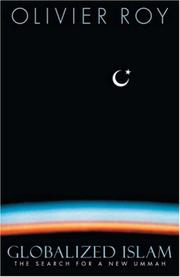
ISBN: 9780231134996 0231134991 0231134983 9780231134989 Year: 2004 Publisher: New York (N.Y.) Columbia University Press
Abstract | Keywords | Export | Availability | Bookmark
 Loading...
Loading...Choose an application
- Reference Manager
- EndNote
- RefWorks (Direct export to RefWorks)
#SBIB:316.331H421 --- #SBIB:316.331H330 --- #SBIB:39A10 --- Morfologie van de godsdiensten: Islam --- Godsdienst en politiek: algemeen --- Antropologie: religie, riten, magie, hekserij --- #SBIB:39A10Morfologie van de godsdiensten: Islam --- Globalization --- Islam and politics --- Ummah (Islam) --- Umma (Islam) --- Islam --- Islam and state --- Global cities --- Globalisation --- Internationalization --- International relations --- Anti-globalization movement --- Religious aspects&delete& --- Islamic countries --- Politics and government. --- Religious aspects
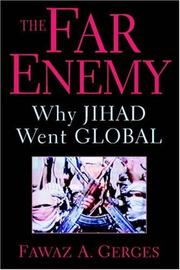
ISBN: 9780521791403 0521791405 9780511512049 9780521794770 0511161417 9780511161414 0511220871 9780511220876 9780511160134 0511160135 0511160704 9780511160707 1280480254 9786610480258 051151204X 0511300433 1107143497 0521794773 Year: 2005 Publisher: Cambridge: Cambridge university press,
Abstract | Keywords | Export | Availability | Bookmark
 Loading...
Loading...Choose an application
- Reference Manager
- EndNote
- RefWorks (Direct export to RefWorks)
Since September 11, Al Qaeda has been portrayed as an Islamist front united in armed struggle, or jihad, against the Christian West. However, as the historian and commentator Fawaz A. Gerges argues, the reality is rather different. In fact, Al Qaeda represents a minority within the jihadist movement, and its strategies have been criticized and opposed by religious nationalists among the jihadis, who prefer to concentrate on changing the Muslim world rather than taking the fight global. Based on primary field research, the author unravels the story of the jihadist movement and explores its philosophies, its structure, the rifts and tensions that split its ranks, and why some members, like Osama bin Laden and his deputy Ayman al-Zawahiri, favored international over local strategies in taking the war to the West. Gerges asks where the jihadist movement is going, and whether it can be transformed into a non-violent, socio-political force.
850 Vrede- en conflictstudies --- 845 Religie --- 824 Globalisering --- 297 --- 323.1 --- 327.39 --- Islam : dreiging --- Jihad. --- Islam and world politics. --- WarReligious aspects --- Islam --- International relations. Foreign policy --- Polemology --- War --- Religious aspects --- Islam. --- World politics and Islam --- World politics --- War and Islam --- Holy war (Islam) --- Islamic holy war --- Jahad --- Jehad --- Muslim holy war --- War (Islamic law) --- Arts and Humanities --- History --- War - Religious aspects - Islam.
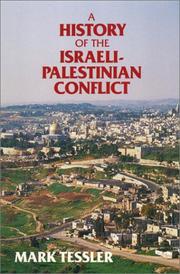
ISBN: 0253358485 0253208734 9780253208736 9780253358486 Year: 1994 Publisher: Bloomington (Ind.): Indiana university press,
Abstract | Keywords | Export | Availability | Bookmark
 Loading...
Loading...Choose an application
- Reference Manager
- EndNote
- RefWorks (Direct export to RefWorks)
History of Asia --- anno 1900-1999 --- Israel --- Palestine --- History of Asiaanno 1900-1999Israel --- Arab-Israeli conflict --- Arab-Israeli conflict. --- 812 Ideologie --- 815 Geschiedenis --- 823 Diplomatie --- 828 Geografie --- 841.3 Politieke bewegingen --- 841 Politiek Bestel --- 844.3 Migratie en vluchtelingen --- 845 Religie --- 850 Vrede- en conflictstudies --- 855 Oorlogsvoering --- 856.1 Conflictpreventie --- 883.4 West-Azië --- Israel-Arab conflicts --- Israel-Palestine conflict --- Israeli-Arab conflict --- Israeli-Palestinian conflict --- Jewish-Arab relations --- Palestine-Israel conflict --- Palestine problem (1948- ) --- Palestinian-Israeli conflict --- Palestinian Arabs --- History
Book
ISBN: 1555874363 1685852920 Year: 1994 Publisher: London Lynne Rienner Publishers
Abstract | Keywords | Export | Availability | Bookmark
 Loading...
Loading...Choose an application
- Reference Manager
- EndNote
- RefWorks (Direct export to RefWorks)
800 Collectie Vlaams Vredesinstituut --- 810 Theorie en Methode --- 823 Diplomatie --- 835 Natuurlijke rijkdommen --- 838.1 Ecologie --- 841 Politiek Bestel --- 841.1 Democratisering --- 845 Religie --- 848 Demografie --- 850 Vrede- en conflictstudies --- 856.1 Conflictpreventie --- 860 (Vredes)cultuur --- 861 Vredesbeweging --- 873 Wapenbeheersing --- 883.4 West-Azië --- Conflict management --- Peace-building --- Conflict control --- Conflict resolution --- Dispute settlement --- Management of conflict --- Managing conflict --- Management --- Negotiation --- Problem solving --- Social conflict --- Crisis management
| Listing 1 - 10 of 17 | << page >> |
Sort by
|

 Search
Search Feedback
Feedback About UniCat
About UniCat  Help
Help News
News